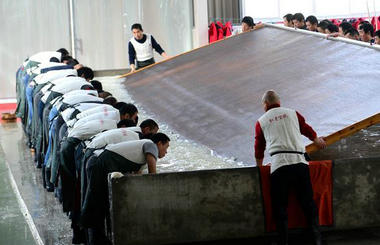China box office to rule by 2018, Imax CEO says
By Sun Ye ( China Daily ) Updated: 2015-12-10 08:46:34
 |
|
Imax CEO Richard Gelfond. [Photo provided to China Daily] |
China will overtake the United States to become the world's largest box office by 2018, says Imax CEO Richard Gelfond in an exclusive interview to China Daily.
The country is expected to have the largest number of cinema screens by then, says the top official of the Canadian company that provides high-tech movie viewing across the world. Imax announced on Tuesday that it will work with CJ CGV, a South Korean entertainment company, to open 25 more Imax theaters in China, taking the number of such cinemas to more than 500.
"There are around 40,000 screens in the US. By 2017, the number of screens (in China) will surpass the US," Gelfond says. "The box office (in China) will surpass that of the US by 2018."
Gelfond describes it as a "turning point" in China's entertainment history.
"It's very important for the critical mass it shows," Gelfond says. "When a network reaches such a scale and size, it has more leverage."
Imax entered China in 2002.
China's movie industry has grown rapidly in the past few years. The Chinese mainland now has more than 31,000 screens, of which, more than 350 are large screens of the likes of Imax and Dmax, a China-based private company. The country's box office this year made more than 40 billion yuan ($6.23 billion) in revenue as of Dec 3, according to China Film News, a local newspaper.
"It's still an early stage," Gelfond says of the growth. "There is no question that more screens will be needed in the next decade."
China's advantages are its people with more money at their disposal today than in the previous decades and a stronger appetite for affordable entertainment. They also have a smaller range of leisure activities to choose from as compared with US residents, which will continue to drive China's domestic movie industry in the next few years, he says.
He also expects international moviemaking to take more into account the needs of Chinese audiences, from storyline to casting.
"It's already happening," Gelfond says.
The Martian, a sci-fi movie by Ridley Scott, for instance, shows the rescue of a stranded astronaut made possible through the intervention of a fictional Chinese space facility. The feature, starring Matt Damon, grossed 490 million yuan at the Chinese box office by Tuesday, after screening in the country for two weeks.
While Imax plans to distribute its screens in Chinese cities of all sizes, Dmax recently celebrated the installation of its 100th screen, in Chengdu in Southwest China's Sichuan province.
Mao Yu, deputy director of the film bureau under the State Administration of Press, Publication, Radio, Film and Television, said at a Dmax event that investment in movie technology was starting to pay off, and more companies were getting involved in the area, according to Xinhua New Agency.
Yu Chao, deputy general manager of Capital Cinema, one of Beijing's oldest cinemas, says: "Chinese audiences are looking for all-round, enjoyable experiences rather than just a good storyline. That's why there is more demand for 3-D, Dolby and 4-DX effects.
"The way cinemas engage the audiences makes a difference. We will be constantly needing better equipment to deliver that experience."
After all, Yu says, audiences are won over if they get a "good time" in the cinemas for the money they pay.
|
|
|
|
|
|
|
|























 Raymond Zhou:
Raymond Zhou: Pauline D Loh:
Pauline D Loh: Hot Pot
Hot Pot Eco China
Eco China China Dream
China Dream China Face
China Face






